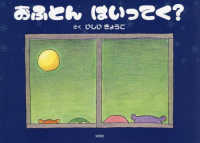基本説明
The issue of whether the age at which individuals are exposed to a second language plays a role in the manner and/or the success with which they come to grips with the new language is the subject of much debate among researchers.
Full Description
This book takes a hard look at some of the assumptions that are customarily made concerning the role of age in second language acquisition. The evidence and arguments the contributors present run counter to the notion that an early start in second language learning is of itself either absolutely sufficient or necessary for the attainment of native-like mastery of a second language. Another theme of the book is a doubt that there is a particular stage of maturity beyond which language learning is no longer fully possible. In short, the book presents a challenge to those who take it as given that second language learning is inevitably different in its essential nature from language acquisition in the childhood years and that second language knowledge acquired beyond the critical period is in all circumstances and in all respects doomed to fossilize at a non-native-like level.
Contents
Foreword
David Singleton: Introduction: A Critical Look at the Critical Period Hypothesis in Second Language Acquisition Research
1. Theo Bongaerts, Brigitte Planken and Erik Schils: Can Late Learners Attain a Native Accent in a Foreign Language? A Test of the Critical Period Hypothesis
2. Vivian Cook: Multicompetence and Effects of Age
3. Hans W. Dechert: Some Critical Remarks Concerning Penfield's Theory of Second Language Acquisition
4. Georgette loup: Evaluating the Need for Input Enhancement in Post-Critical Period Language Acquisition
5. Zsolt Lengyel: Some Critical Remarks on the Phonological Component
6. Gita Martohardjono and Suzanne Flynn: Is there an Age Factor for Universal Grammar?







